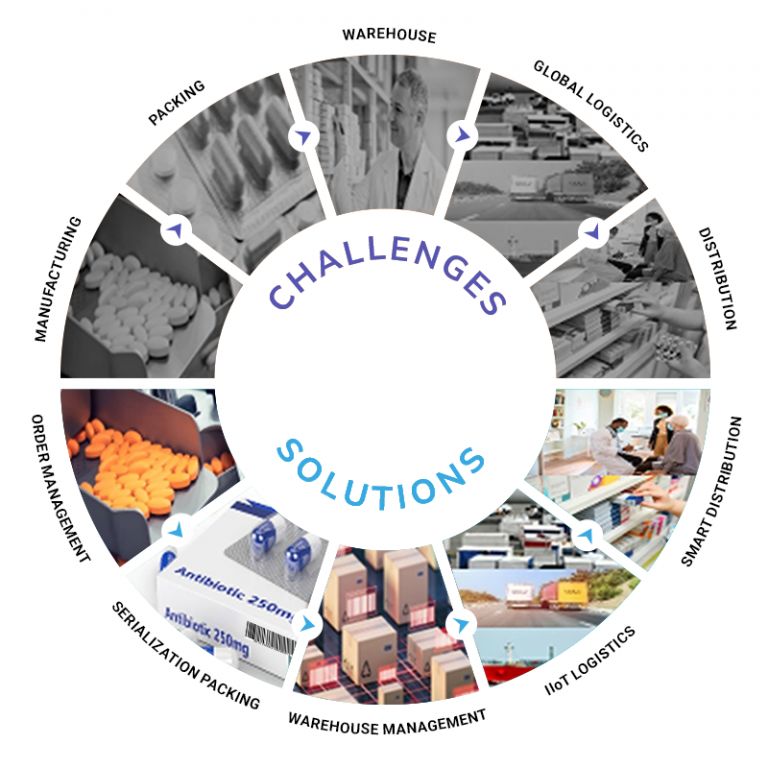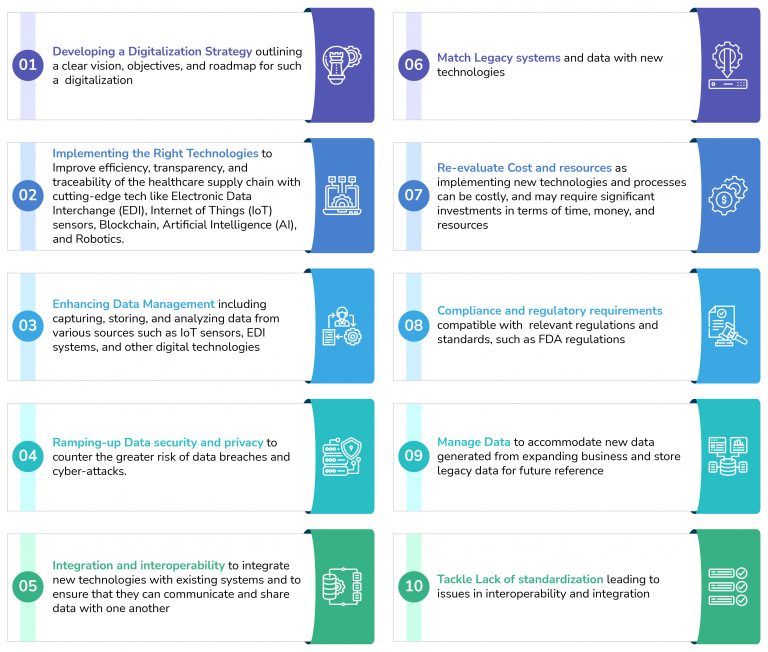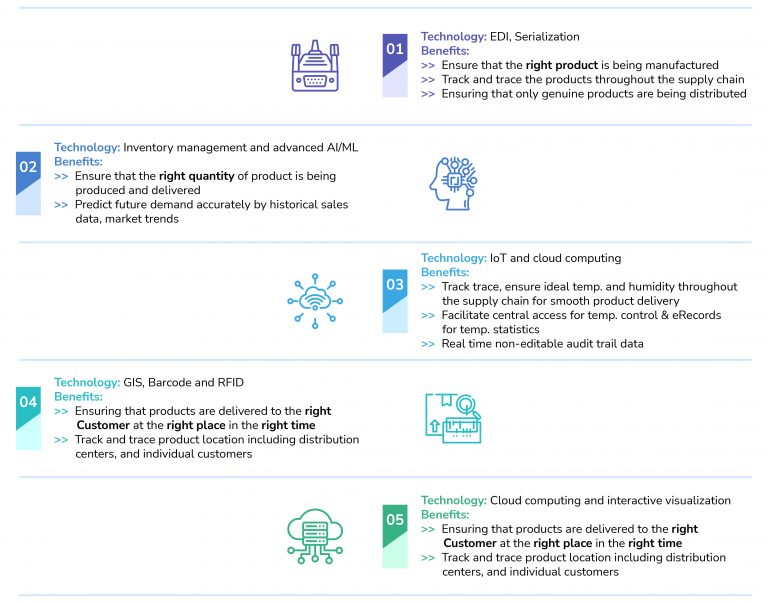Introduction:
Supply chain management (SCM) is the management of the flow of goods and data connected to a product from the procurement of raw materials to the delivery of the product. Digitizing the supply chain has empowered Healthcare providers to promptly deliver the correct product to consumers, while staying cost-effective. Creating a robust digital supply chain will place healthcare businesses in a better position to benefit from technological advancements enhancing data flow, analytics, practitioner connectivity, asset monitoring, and meeting stringent regulations.
Challenges in the Healthcare supply chain:
The Healthcare Supply Chain is complex and challenging. It involves multiple stakeholders in the process of linking healthcare products.
The 7R framework is a suitable approach for achieving an effective Healthcare Supply Chain, ensuring that the right products are delivered to the right customers in the right quantity, at the right time, in the right place, in the right condition, and at the right price. Let us look at the inherent challenges in meeting these many rights.
Right Product: Ensuring the right product is being manufactured, packaged, and distributed to the customer is crucial in the Healthcare supply chain. However, identifying and tracking the right product can be difficult due to the diversified type of healthcare products available and the different packaging options. Additionally, the need for strict quality control measures as per the complex regulatory requirements and counterfeit drugs can be a major issue, which can pose significant risks to patient health.
Right Quantity: Healthcare companies have one of the biggest challenges in ensuring the right quantity of products are being manufactured to meet customer demand. This can be a challenging task, particularly when it comes to managing inventory levels and overstocking, which can lead to wastage, or stockouts, which can result in patient care disruption.
Right Condition: The challenge in ensuring the right condition is to maintain the temperature and humidity of products as well as the risk of damage during transit. Many Healthcare products are temperature, humidity, and light sensitive. These products must be stored and transported in controlled environments to ensure their integrity. Additionally, products must be tracked and traced throughout the supply chain to ensure that they are delivered in the right condition.
Right Place:The Healthcare Supply Chain involves multiple stakeholders, including manufacturers, warehouses, distributors, wholesalers, and retailers. which can make it challenging to ensure that products are delivered to the right place at the right time, especially when multiple locations are involved and stake holders do not have real-time visibility into the movement of healthcare products.
Right Time: The Healthcare supply chain involves multiple stakeholders, unpredictabilities of weather and complex logistics, which can make it challenging to ensure that products are delivered to customers at the right time.
Right Customer: The challenge in ensuring that right products are delivered to the right customers, including hospitals, pharmacies, and individual patients is to identify the right customers and maintain the accuracy of customer data from various types of security risks, such as data breaches, cyber-attacks, and theft.
Right Price: The cost of healthcare products can be high due to the complexity of the manufacturing process, R&D cost, and the need for strict quality control measures. This can make it challenging for healthcare companies to balance the need to control costs with the need to ensure that patients have access to the products they need, particularly in a healthcare system that is already under strain.
Overall, the challenges involved in implementing the 7Rs of supply chain management in the healthcare industry highlight the need for robust and integrated digital solutions that can provide real-time visibility, traceability, and control across the supply chain. Digital transformation can play a significant role in addressing the challenges involved in the complex Healthcare Supply Chain.

Digital transformation Solutions for complex healthcare supply chain:
Digitalization of the complex healthcare supply chain refers to the use of digital technologies to improve the efficiency, transparency, and traceability of the supply chain. This can include the use of technologies such as:
- Electronic Data Interchange (EDI) and serialization systems can be used to ensure that the right product is being manufactured, packaged, and distributed to the customer. These systems can be used to track and trace products throughout the supply chain, from the manufacturer to the patient, ensuring that only genuine products are being distributed.
- Demand forecasting, Advanced analytics and AI/ML algorithms can be used to analyze data from multiple sources, including historical sales data, market trends, and social media, to predict future demand accurately. Additionally, real-time inventory management systems can be used to monitor stock levels and ensure that the right quantity of product is being produced and delivered to meet customer demand and automate the replenishment process, reducing the risk of stockouts or overstocking.
- IIoT sensors can be used to ensure that products are delivered in the right condition, considering factors such as temperature, humidity, and light exposure that can affect product integrity. Digital Cold chain management can be used to create an immutable record of the product’s condition and place throughout the supply chain, ensuring full traceability and transparency.
- Geographic Information Systems (GIS), RFID & barcode scanning enabled warehouse management systems can be used to track products’ location and manage the global smart distribution process, helpful in ensuring that products are delivered to the right Customer at the right place including warehouses, distribution centers, and individual customers.
- Transportation management systems and real-time tracking systems can be used to ensure that products are delivered to customers at the right time. These systems can be used to manage transportation routes, track deliveries in real-time, and adjust delivery schedules in response to factors that affect delivery time.
How right partners are helpful in Digitalization of supply chain:
The digitization of the pharmaceutical supply chain can bring many benefits, such as improved efficiency, transparency, and traceability. However, the process of digitization can also present some challenges that need to be addressed.
Summary:
How right partners are helpful in Digitalization of supply chain:
The digitization of the pharmaceutical supply chain can bring many benefits, such as improved efficiency, transparency, and traceability. However, the process of digitization can also present some challenges that need to be addressed.
To effectively digitalize the healthcare supply chain, it’s important to collaborate with right partners who develop the systems on risk-based approach such as,

Summary:
The healthcare supply chain is complex, involving multiple stakeholders who are responsible for bringing drugs from the manufacturer to the patient. The 7R framework, comprising Right Product, Right Quantity, Right Condition, Right Place, Right Time, Right Customer, and Right Price, is used to achieve a successful healthcare supply chain. However, challenges arise in maintaining the seven elements due to several factors, such as identifying and tracking the right product, forecasting demand, maintaining the right condition, delivering to the right place and customer, and balancing the cost of healthcare products with the need to control costs.
To address these challenges, digitalization of the healthcare supply chain is proposed. Technologies like Electronic Data Interchange (EDI), serialization systems, demand forecasting, IoT sensors, temperature monitoring systems, and geographical information systems (GIS) are used to improve the efficiency, transparency, and traceability of the supply chain.
Collaborating with the right partners is crucial in developing a digitalization strategy, assessing current systems and processes, and implementing risk-based approach for digitalization.
“MOURI Tech has overall 15 years of experience in digital technologies, we provided robust solutions for managing the healthcare supply chain to global pharmaceutical companies and formed strategic partnerships to develop applications for patient support programs, created analytical dashboards to track product life cycles, and designed multiple interactive dashboards to visualize business growth. These achievements have contributed to a successful business journey.”
Digitail Transformation technology:



